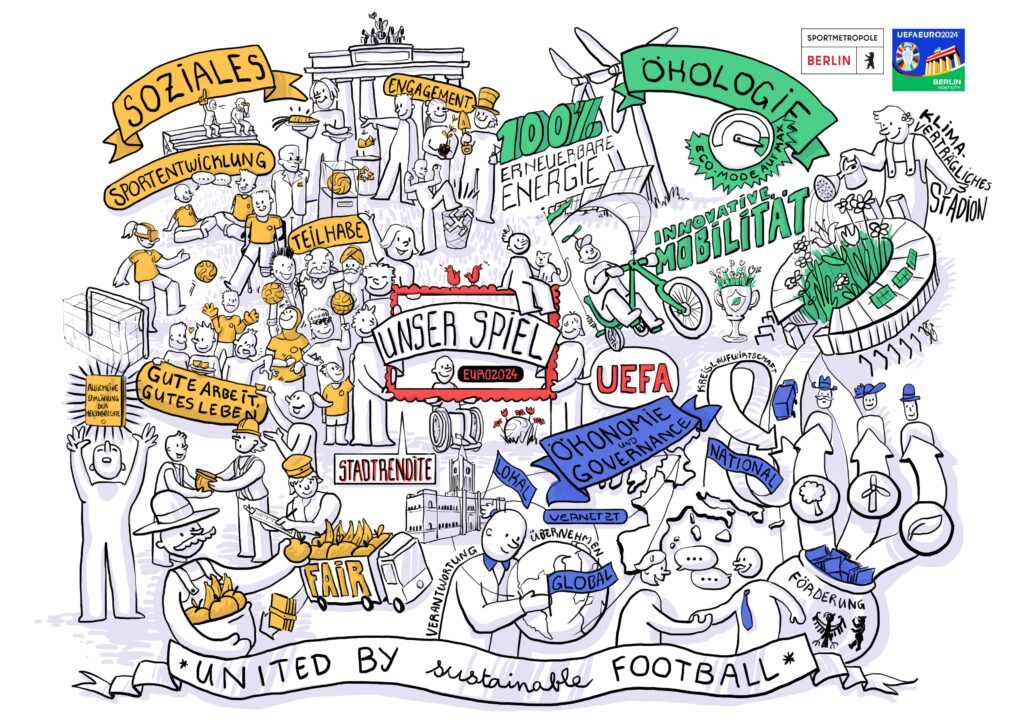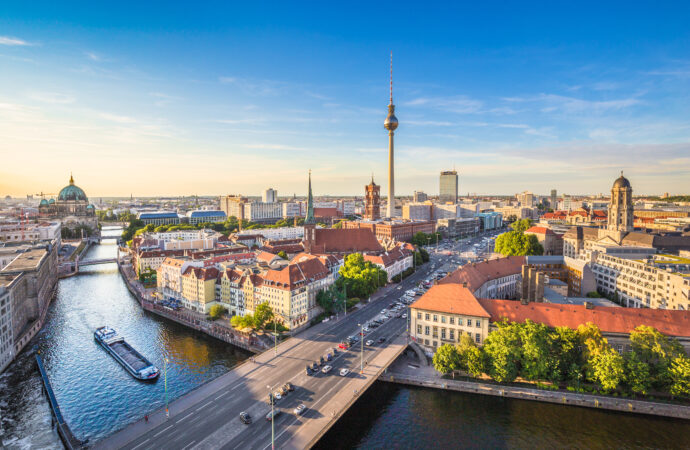Michael Jopp, Head of Sustainability Management for UEFA EURO 2024 and Coordinator of Host City Sustainability for the Senate Department of the Interior, Digitalization and Sport, explains Berlin’s approach towards hosting the world’s third largest sporting event.
Of approximately 3.5 million people living in Germany’s capital city, around 20% doesn’t have a German passport. With settlers predominantly from Eastern Europe, Turkey, and, more recently, Syrian and Ukrainian refugees, Berlin is a city inseparable from its diversity.
The Senate Department for the Interior, Digitalization and Sport – organisers of UEFA 2024 in Berlin – entwined this diversity with the ‘The guiding principle of sustainability for UEFA Euro 2024 in Berlin’, empowering residents ‘to act locally and think globally’ to create a sustainable legacy both in and beyond football.
Such an all-encompassing goal isn’t unfounded. In fact, Berlin has developed itself throughout the 21st century into one of Europe’s sustainability hubs. The city government’s commitment to sustainable technology has enabled projects like the Berliner Startup Stipendium and Greentech Festival to progress from strength to strength. These projects bring the city’s environmental actors together and football is no exception. Clubs like FC Internationale Berlin, which The Sustainability Report covered last year, have playing a major role in raising awareness and making progress on a multitude of social and environmental issues.
During major sports events, cities usually enforce rules of the organiser (i.e., UEFA), but city governments have been empowered to become more like event managers for EURO 2024. The person in Berlin at the top of this tree ensuring that theory becomes action is Michael Jopp, head of sustainability management for UEFA EURO 2024 and Coordinator of Host City Sustainability for the Senate Department of the Interior, Digitalization and Sport.
Jopp explains to The Sustainability Report that every host city has a manager in his position to oversee activities. Connected in a network as part of a host city working group, the managers meet every three weeks to discuss topics that concern them all, with larger groups that include federal ministries organised for broader topics like human rights. These discussions influenced the Human Rights Declaration for UEFA EURO 2024, launched on 14 November 2023 in Berlin.
Berlin functions as a city, but also as a Bundesland, or federal state. Jopp implies that the political impact and responsibility placed upon Berlin is therefore elevated, but carrying this extra burden doesn’t mean that Berlin’s team is any bigger than other host cities; in addition to a core group of around 25, agencies to orchestrate other parts of the programme expand the team to around 100 people.
The essence of Berlin’s programme revolves around adapting key elements of UEFA’s EURO 2024 ESG Strategy, which seeks to ‘activate host cities’ in a few key areas.

One is smart mobility. In 2018, the Berlin Mobility Act was passed, aligning the city’s strategy towards environmentally friendly transport. Only one in three people in Berlin owns a car, but the act seeks to reduce this further and is the first legislation of its kind in Germany.
The goal of this concept, according to the Senate Department for Urban Mobility, Transport, Climate Action and the Environment, ensures that everyone in the city reliably and comfortably arrives at their destination, ‘irrespective of the availability of one’s own form of transport or of physical limitations.’ Adaptability must be a priority of any major city’s transport system, and Berlin have ensured this with interventions such as ‘Wheelmap’, an online map to check accessibility in a person’s direct vicinity, and free mobility assistance services for buses and trains; a measure unique in Europe.
This all relies on Berlin’s public transport system, comprising the U-Bahn (subway), S-Bahn (light ‘city’ rail), buses and trams, with free-floating car sharing also a popular option. Most U-Bahn stations, the entire S-Bahn network and BVG (Berliner Verkehrsbetriebe: Berlin’s main public transport company) fleets of buses and ferries are all wheelchair accessible.
Building from these cornerstones of city policy, Berlin are using two apps that were successfully used at the Special Olympics World Games, held in Berlin in June 2023, to promote smart and sustainable mobility during EURO 2024. One integrates Google Maps and VBB (Berlin’s public transport authority) route planners for spectators to avoid traffic congestion by optimising travel routes, and the other – GuideMeGo – helps people with disabilities establish how they can get from A to B by incorporating a video assistance system that supports the visually impaired.
With so many stakeholder groups affecting and being affected by the tournament, Jopp explains that a “big roof idea” was needed to orchestrate all the sustainability efforts beyond Berlin’s core programme, culminating in the ‘EURO 2024 Academy’.
The Academy prioritises active participation of Berlin’s wider society to design solutions-oriented projects, and has primarily been achieved by the city opening a fund of €1 million for sports clubs and NGOs in Berlin to create their own social and educational projects around the tournament. Jopp says there are 45 such projects in Berlin leading up to the tournament, with more due to take place during the summer.
One example is amateur club Tennis Borussia Berlin’s ‘Naturally Football’ project, a climate and environmental protection digital workshop that supports football clubs across Germany to position themselves more sustainably. Another project provides funding to the aforementioned FC Internationale Berlin to reduce their reliance on volunteers – an all-too-common problem across the grassroots sustainability scene.
Like Berlin, UEFA has established a climate fund from which German amateur clubs can request financial support for climate protection projects, and the governing body are likely to also suffer from what Jopp believes is the hardest challenge of their abundance – which to fund. “I could talk for over an hour about all of them” he adds.
Despite so many plans and initiatives to oversee, Jopp stresses the importance of transparency, even if 100% of projects are not fully realised. He suggests that a very good result would revolve around placing focus on comprehensively implementing a topic across the board, rather than the complete implementation of every measure and every project.
“Football in Berlin is so much more than one event,” Jopp remarks, reflecting on the integrity of the city’s football culture, “but let’s hope that in the end, it’s [EURO 2024] a sustainability festival as much as a festival of football.”
For EURO 2024 to spark the desired sustainability sparks off its trajectory during the summer, Jopp insists that positive sustainability stories need to be more prolific, suggesting that you can do 100 great projects for the press only to pick up on one that isn’t working. “That doesn’t help the topic of sustainability itself,” he remarks.
By recognising this negative frame, in addition to major sports events intertwining with the cultures of cities that are their bedrock, perhaps the positive stories at events like EURO 2024 can truly change this narrative in the coming year.
Opt into our weekly newsletter for exclusive content focused on sustainability strategy, communication and leadership for sport’s ecosystem.










Leave a Comment
Your email address will not be published. Required fields are marked with *